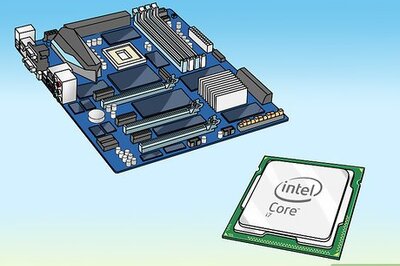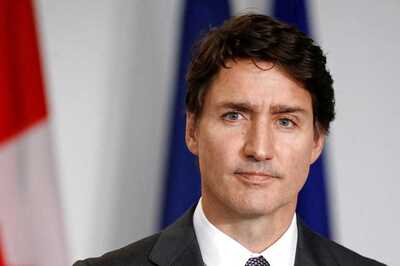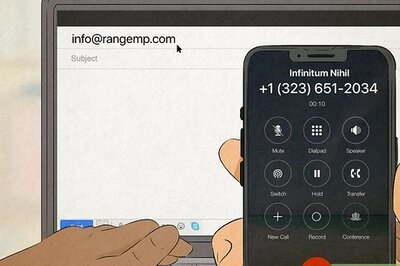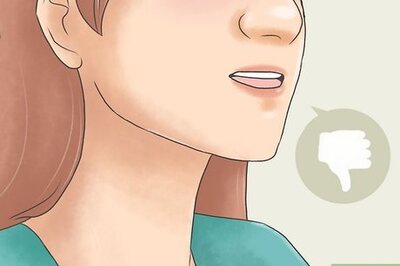
views
General Irish Slang Phrases
Irish slang is incredibly descriptive. It’s almost like a language unto itself. This is because a lot of Irish slang is based on Gaelic, the ancient language of Ireland. These general phrases refer to everything from a guy or girl to words that emphasize the subject being discussed. You don’t need to speak with an Irish accent to know that Irish slang often uses different words to describe the same thing. Banjaxed: Means “broken” or “not working.” “The car won’t start and is totally banjaxed.” Barrer: Means a “wheelbarrow.” “Grab the barrer and load it up with bricks.” Beour: Refers to an “attractive woman” or someone’s “girlfriend.” “She’s a real beour. He’s a lucky man.” Bleedin’: “Very” anything you mention. “It’s bleedin’ cold outside.” Bog roll: Refers to “toilet paper.” “We’re out of bog roll in the bathroom.” Boyo: Any “juvenile male.” “Come here, boyo, and get to school.” Cailín: Irish slang for a “girl.” “She’s a Cailín you’re going to love.” Cat: Means “bad.” “The exam was totally cat.” Chipper: A “fish and chips shop” where you can order takeout (called “takeaway.”) “We’re going to the chipper for a late night meal.” Clatter: Means any “large amount.” “You’ve got a clatter of exams you need to study for.” Clem: To “steal something.” “Don’t clem that shirt; it doesn’t belong to you!” Cop on: A term to describe “getting something.” “Cop on to that parking spot right there.” Culchie: Refers to someone “from the country” or anyplace “rural.” “She’s a culchie who grew up on a farm.” Deadly: Means “brilliant,” “fantastic,” or “great.” Fair play: Means “good job” or “good on you.” “Fair play to you for playing such a great football match.” Feck: A lesser version of an “f” expletive. “Oh feck, what’s going on?” Feek: Refers to an “attractive person.” “They’re a real feek; I’d love to go out with them.” Fella: Refers to your “partner/boyfriend/man.” “He’s been my fella for over 2 years now.” Fine: A way to cut off a conversation you don’t want to have. “What’s the matter? Fine.” Flah: To “show off” or “boast.” “Don’t flah about how good you did on the test.” Fry: A word describing an Irish breakfast. “Let’s enjoy a delicious fry tomorrow morning.” Gaff: Term for a “house.” “We’re moving into a brand new gaff next month!” Gammy: Means anything “crooked” or “odd-looking.” That gammy road had a lot of twists and turns.” Gas: A “funny” or “amusing” person. “The comedian last night was such a gas.” Give it a lash: Used to describe “quick movement” or a person you find “attractive.” “Give it a lash and hurry up.” Giving out: Means “to scold” or “complain.” “She was giving out about how disappointed she was.” Grá: A Gaelic term for “love.” “It’s pure grá; I love you more than anything.” G’wan: A short Irish variation of “go on.” “G’wan, they’re waiting for you at the store.” G’way: Means “you’re joking or kidding.” “G’way, that can’t be what happened.” Holy show: Refers to a “disgraceful scene.” “They made a holy show of themselves last night.” Jammers: Means “extremely full.” “The pub was totally jammers this weekend.” Jaysus: An Irish phonetic spelling of “Jesus” used for emphasis or surprise. “Jaysus, can you believe that?” Keen: Means “eager” or “enthusiastic.” “She’s keen on going to England for her holidays.” Knackered: Means “tired” or “exhausted.” Legends: Anyone who is “highly respected.” “Those legends are the best professors they’ve got.” Lethal: Means “excellent” or “amazing.” “The performance was lethal; I loved it.” Like: A filler word the Irish use as many Americans use “um.” “It’s a brilliant film, like.” Lock-in: Refers to the act of “drinking in a pub” after hours. “We had a lock-in until 6 in the morning.” Mog: An affectionate term for a “child” or “pet.” “The little kitty’s such a mog.” Mucker: Refers to a “friend” or “companion.” “He’s been a mucker to me for ages.” Nixer: Refers to a “job done for cash” to avoid paying tax. “Hire a nixer to get the job done quickly.” Oul dear: An “old woman,” and sometimes specifically a “mom.” “The oul dear is doing well these days.” Oul fella: An “old man.” “Look at the oil fella trying to get down the street.” Poxy: Means something is “not great” or “not working.” “The class is poxy; it doesn’t make any sense.” Press: A “cupboard” or “closet.” “I’m putting your groceries in the press.” Pure: A word that emphasizes whatever comes after it. “The stew was pure delicious.” Puss: To be “sulking” or “sad-faced.” “His puss didn’t get better all night.” Quare: Another word for “very.” “The show was quare good.” Ride: Speaks about a “good-looking person.” “Your friend is such a gorgeous ride.” Rotten: Means “bad” or “unpleasant.” “The odor was rotten in that refrigerator.” Scundered: Means “embarrassed” or “ashamed,” particularly in Northern Ireland. “She was absolutely scundered when she walked into her surprise party.” Sham: A term of endearment for a “friend” or “acquaintance.” “She’s been a sham since we met at school.” Slagging: The act of “teasing” or “mocking” someone. “The bully at school was slagging me off all day.” Sound: When “all is good,” which is also used in Britain. “How is she? She’s sound.” State: Refers to a “mess” or “chaotic” situation. “Look at the state of you.” Take the piss: A more colorful way to describe the act of “mocking” someone. “They were all telling jokes about him and taking the piss in general.” The jacks: Refers to “the toilet.” “I’m off to the jacks; be right back.” Wee: Anything “small” or “tiny.” “He was just a wee lad.” Yoke: Originally referred to as the “collar of a farm animal,” but can be used with anything currently.” “Go for the yoke and win that prize.”
Greetings in Irish Slang
There are so many ways to say “hello” in Irish using slang. The Irish are a notoriously friendly people, so why wouldn’t their many greetings vary from “grand” to Hows-a-going” and more? Many greetings are considered casual and can be interchanged, depending on who you talk to. Some greetings are more regularly used in Dublin, while others can be heard all over Ireland. Craic: Means “fun”; used as a common greeting. “The pub last night was really good craic.” Grand: Means “good” or “great”; the equivalent of “that’s nice” in the U.S. “My holiday in Italy was grand.” How ya getting on/How’s the form?!: Another Irish way of saying “How are you?” “How ya getting on? I’m doing grand.” Hows-a-going?: A manner of saying “How are you doing?” “How ya getting on? Really well, thanks.” Howya: A Dublin greeting that means “hello.” “Howya, Niall?” “Pretty fair.” How’s she cutting?: A way to say “how are things” or “what’s new” in Ireland. “How’s she cutting?” “Just fine.” Story horse?!: A unique Irish term for “how is it going?” is often used in Dublin. “Story horse? Oh, I’m feeling pretty good.” Well: Regularly the first word used in a greeting.” “Well, how are you then?” What’s the craic or story?: Another way to say “how are you doing?” “What’s the story today, Shane?”
Irish Slang Phrases Meaning Good
The Irish love talking about what they adore most. They use several different slang terms and phrases to say “good” or “great.” Their positivity is very expressive, whether calling something they like “savage,” “class,” or “sound.” When they’re into something, they want to tell you all about it. Bang-on: Refers to any “good situation or person.” “He’s a real bang-on type of guy.” Class: Means anything or anyone “great.” “The show was total class.” Cracking: Another way to describe something as “brilliant.” The movie was cracking. I loved it.” Dead on: A “positive way to describe someone.” “The lawyer is dead on. He’s brilliant.” Savage: Means “brilliant” or “great.” “The concert last night was savage.” Sound: Refers to “someone you like” or “something you enjoy.” “The school program is really sound.” Unreal: Anything “fantastic,” “unique,” or “unbelievable.” “The beach at the resort is unreal.”
Irish Slang Insults
Irish insults have different ways to call you an “idiot.” Some of their words for a “stupid” person are kind, or funny, while others are downright brutal. You may not even guess they’re insulting you when they refer to you as a “dosser” or “dryshite.” Their language knows no bounds when poking fun at those they don’t like (and those they like). Amadán: Anyone who is a “fool” or “idiot.” He was an amadán and had no idea what he was doing.” Bollocks: Also an English term meaning “rubbish” or “nonsense.” The rules at the pub are bollocks.” Eejit: Refers to an “idiot.” “Look at the eejit embarrassing himself over there.” Chancer: A “person who takes a risk.” “He’s a real chancer who’s bound for trouble!” Cute hoor: A person who “quietly engineers” things so they can take advantage. “What a cute hoor to get what they want.” Dope: A “foolish” or “gullible” person. “The customer is a real dope.” Dosser: Refers to someone who “doesn’t work.” “He’s just a dosser and hasn’t got a job.” Dryshite: A person who is “boring” or “not any fun.” “The teacher is a dryshite; she is such a bore.” Geebag: Any “irritating” or “obnoxious person.” “What a loudmouth and geebag he is.” Gobdaw: Taken from the Irish “gabhdán,” referring to a gullible person.” “Don’t be such a gobdaw; they’re trying to take advantage of you.” Gobshite: A “braggy” or “mean” person.” “What a gobshite he is. He talks about nothing but how big his house is.” Gombeen: Refers to a “mean,” “underhanded,” or “corrupt” person. “Don’t trust that gombeen as they’ll fool you to get what they want.” Gowl: Means “fork in the road” or “foreigner.” “We came to a gowl and didn’t know which way to turn.” Hallion: A “mischievous” person or a “rascal.” “He’s a hallion when it comes to sneaking around.” In bits: Anything that “isn’t as it should be.” “I overworked myself the whole week and am in bits today.” Jackeen: A term a rural Irish person gives to a “Dubliner.” “He’s such a jackeen and thinks it’s all about Dublin.” Kip: Means “the unpleasant state in which you leave some place.” “He left the house a total kip.” Langers: A Cork expression used any time you get “drunk.” “He was langers after the bar crawl last night.” Manky: Refers to something “disgusting” or “gross.” “The garbage bin was so manky today.” Melter: Someone who is a “nuisance” or “annoyance.” “She was talking all night and was a real melter.” Minus craic: So much of an un-fun time that it was “minus fun.” “That class was minus craic for an hour straight.” Muppet: Any “foolish” or “gullible” person. “She was a muppet for believing your fake story.” Plonker: Another way of calling someone an “idiot” or “fool.” “Don’t be such a plonker about your life.” Pox: Any person who is a “nuisance.” “He’s a pox that won’t leave me alone.” Sap: Refers to a “fool” or “simpleton.” “What a sap he is to believe everything he hears.” Scut: An Irish insult for anyone “bad,” “stupid,” or “unpleasant.” “Get away from me, you scut!” Shitehawk: A specific term for any “scavenger bird,” such as a hawk. “The shitehawk is picking their bones clean.” Thick: Means “dull” or “stupid.” “Don’t be so thick. You don’t know anything, do you?” Tool: A way to call someone “dumb” or a “clown.” “This tool just fell down in the road.” Tosspot: Either a “contemptible” person or a “drunkard.” “The tosspot didn’t know which way he was going.” Wagon: A woman who “isn’t nice.” “She’s such a wagon—nobody likes her.”
Irish Slang Phrases About Drinking
These vivid phrases are about a night out drinking. Many of them describe different types or sizes of alcohol or refer to the act of drinking itself. Some of these phrases also talk about how you might feel the morning after going out with friends in Ireland. You’ll never run out of cool phrases to use when you celebrate a bit too much. Fluthered: Means “very drunk.” Hammered: One of many irish expressions for being “drunk.” “We got hammered on Tuesday night.” In a heap/in a hoop: A descriptive term for a “hangover.” “I woke up in a heap this morning and felt super sick.” In rag order/in ribbons: Another way to describe being sick or hungover. “I’m in rag order today after partying last night.” Locked: Means “very drunk.” Other similar phrases include “buckled,” “scuttered,” and “baloobas.” Mouldy: Someone who is “very drunk.” “He’s too mouldy to drive home.” Naggins and Shoulders: Different sizes of alcoholic drinks, where naggins is normal-sized, while shoulders are small enough to sneak in. “The drinks you’re trying to put into your bag are naggings; they’ll never fit.” On the lash: A phrase meaning “going out drinking.” “We were on the lash last Saturday.” Out of your tree/off your head/off your rocker: Paralytic: Anyone who is extremely “drunk or intoxicated.” “Sally was paralytic after she left the pub last night.” Scoops: Refers to any “alcoholic drink.” “We had two or three scoops with vodka last week.” Shook: A term to describe a “hangover.” “Are you still shook after your graduation party?” Sláinte: A toast and way of saying “cheers” in Irish, pronounced “slawn-chaa.” Steamin: A word for someone who is “drunk.” “They were all steamin at the wedding.” Stocious: One of many Irish slang expressions for “being drunk.” “The whole team was stocious after they celebrated the victory.”
Unusual Irish Slang Phrases
These Irish slang expressions stand out from the rest. You may have heard of “craic,” but have you ever heard someone say you’re “acting the maggot?” Irish people have tons of fun phrases about how they’re feeling, what they’re doing, and what they’d like you to say to them in return. Learn just a few and you’ll know more than any tourist who visits Ireland ever does. A bad dose: Refers to a “severe illness.” “She had a bad dose of flu all last week.” Acting the maggot: When you’re “fooling around” or not being serious. “Stop acting the maggot and do your work.” Ah, here!: Expresses “frustration” or “annoyance.” “Ah, here, how do you drive this thing?” Arseways: Means “mixed up,” “backwards,” or “wrong.” “Your arithmetic in this problem is arseways.” Bagsy: A verb that “claims something for yourself.” “I bagsy the front seat.” Codding: To “tease” or “joke” with someone. “We were only codding ya. Don’t take it so seriously.” C’mere to me: A way of saying “listen up; I’m about to tell you something important.” “C’mere to me; I’ve something to say.” Deadly buzz: Any “exciting” or “thrilling” experience. “The hike up the mountain was a deadly buzz.” Donkey’s years: Means “a very long time.” “We haven’t seen each other for donkey’s years.” Eat the head off: Similar to the American term of “bite someone’s head off,” or “lash out.” “Don’t eat the head off me; I was just asking about your day.” Effin’ and blindin’: The same as “swearing” and “cursing.” “They were effin’ and blindin’ me when I accidentally backed into their car.” Gimme a shot: Anytime you want someone to “give you a go.” “Come on, give me a shot with the new toy.” G’way!: An abbreviated form of saying “you’re joking” or “you’re kidding.” “G-way! You can’t be serious.” He/she is your only man/woman!: Used when an Irish person recommends someone for a job or assignment. “He is your only man to fix your sink.” Jammy: Given to anyone who is “lucky” or “flukey.” “Kathy won the lotto; she’s so jammy!” Jesus, Mary, and Joseph: A Catholic phrase used to express surprise. “Jesus, Mary, and Joseph, where have you been?” Lash: Means anything from “heavy rain” to “give something a try” or “go out drinking.” “Make sure to give it a lash before you give up.” Leg it: An expressive term meaning “run.” “Leg it before they catch us!” Lob the gob: A way to describe “kissing someone.” “He will lob the gob if she’ll let him.” Minerals: An Irish term for “soda” or “pop.” “We gave the children minerals with their lunch.” Now we’re suckin’ diesel: Another way to say “Now, we’re really going strong.” “We’re doing better and now we’re suckin’ diesel.” Shaping/shaper: Means “walking with a strut” or in a “cocky” way. “She’s shaping her way down the street.” Shifting: Can refer to a “meeting,” but can also mean “kissing.” “They were shifting at the party so I think they got along well.” Sorry?: An introductory word used similarly to “excuse me?” “Sorry, do you have the time?” Stall the ball: A term meaning “to wait a moment,” “slow down,” or “stop.” “Stall the ball until I understand what you’re talking about.” Stooked: Another way of being “tired” or “exhausted.” “I’m stooked after yesterday’s run.” Stunner: A way to describe a “beautiful” woman. “She’s a real stunner; I can’t take my eyes off of her.” Suds: Means “soap” or “shampoo.” “Buy some suds so I can wash my hair.” Sure look: An Irish filler phrase used when something isn’t in your control. “Sure, look, what can we do?” Swift one: A way of having a “quick drink.” “Come out for a swift one; you’ll be home so soon.” Tae: A unique pronunciation of “tea.” “Do you want some tae?” The craic was 90: Means that the “good times were at their peak.” “The craic was 90. I didn’t ever want to leave.” The messages: An Irish slang term for “groceries,” since they were once sold at the post office. “Did you get the messages on the way home? I’m hungry.” Up to 90: Refers to being “stressed out,” “agitated,” or “busy.” “I was up to 90 and needed a break.” Will I, yea/I will, yea?!: A good example of Irish sarcasm that means you definitely will not. “Will I, yea? You think I’ll drive you to the airport?” Yer man/yer wan: An Irish way of referring to any man; “wan” means “woman.” “Your man who came in yesterday was really excited to see me.” Yonks: Means “a very long time.” “It’s been yonks since we’ve seen each other.”
Dublin Slang
The capital city of Ireland has its own slang favorites. Dublin folks have a particular accent and unique ways of expressing themselves. They tend to use many of the following phrases to show you how they feel or what they’re thinking. If you think you’ve seen all there is to know about Irish slang, keep reading for more Dublin-specific idioms. Brutal: Means “awful” or “dreadful.” “The traffic was brutal at rush hour.” Chiseler: Refers to a “young child.” “He was only a chiseler at 6 years old.” Coddin’ ya: Another way of saying “I’m only joking.” Delira: Means “delighted.” “I was delira that they were coming to visit.” Get outta that garden: Refers to an area of conversation to avoid. Also interchangeable with “get up outta that.” “Get outta that garden. She doesn’t want to talk about it.” Janey Mack: Used as an interjection in a conversation, especially in Dublin. Mot: Comes from the Gaelic “maith,” meaning “good.” “She’s such a mot; I love her.” Scarlet: A description of an “embarrassed” person having a red face. “He was so scarlet after he tripped in front of the whole class.” Whopper: Means “excellent,” “fun,” and “great.” “The concert was a real whopper. I loved it!”
Northern Irish Slang
Northern Irish slang sings a tune all its own. Because Northern Ireland is a combination of Irish, Scottish, and British cultures, their slang terms are unlike anywhere else. One word like “bake” can describe exactly what a person is feeling by looking at their face. See if you can figure out what these phrases mean before looking at the definition. Bake: A way to describe a “face.” “Her bake was so angry that she yelled at you.” Beamer: Describes someone whose face is “red with embarrassment.” “He’s a beamer now that you brought out his baby picture.” Bogging: Means “dirty” or “disgusting.” “The basement was boggin’ since no one had cleaned up in years.” Bout Ye?: Means “how are you” in Belfast. “Bout ye? I’m pretty good myself.” Dander: Refers to something “completely different.” “Go for a dander and take the car for a spin.” Houl yer whisht: A eloquent way to say “shut up.” “Houl yer whisht; I need to say something.” Ogeous handling: Refers to a “tricky situation.” “That accident is some ogeous handling for sure.” Peeler: Describes a “police officer,” based on Sir Robert Peel, the 19th-century founder of the Irish constabulary. Up to high doh: To be in a “nervous” or “excited” way. “I’m up to high doh since the accident.”
Irish Slang for the Weather
Words that describe Irish weather are just as dramatic as the weather itself. You’ll find numerous ways to refer to rain, from a mist to a light rain or a downpour. A sunny day is also something special that Irish people love to talk about when it occurs. Phrases like these are perfect for a country where you get 4 seasons of weather in one day. It’s a day for the fire: Describes a cold winter’s day when you’d want to have a fire to warm up. “It’s a day for the fire. It’s going to snow.” It’s a good day for drying: A dry day when Irish people like to let their clothes dry out in the open. “It’s a good dry for drying. Get your clothes out!” It’s fierce mild out there: A unique way to describe a warm, pleasant day. “I’m going to the beach; it’s fierce mild.” It’s lashing/pissing: Means “raining very hard,” equivalent to “raining cats and dogs.” “It’s lashing out there; there’s no telling when the rain will stop.” It’s spitting: A descriptive way to talk about a “light rain.” “It’s spitting, but not too bad out there.” It’s wetter than an otters pocket: Refers to the wettest kind of “rainy day.” “It’s wetter than an otter’s pocket out there; bring a raincoat.” The sun is splitting the stones: Means that the sun is so bright that it could split rocks. “The sun is splitting the stones; what a beautiful day.” Soft day: Describes a typical Irish day when the rain is so light that it looks invisible but gets you wet. “It’s a soft day today, but you still may need an umbrella.”
Irish Slang FAQs
What is a very Irish thing to say? When it comes to the most Irish greetings, you have a variety of very Irish things to say you can choose from. There’s anything from “Howaya,” meaning “How ya doin',” to “How's she cuttin’?,” meaning “How's it going.” These terms are a way to say hello in a uniquely Irish style.
What is cool in Irish slang? One of the most popular Irish slang words used to describe anything cool or a good time is “craic.” A movie can be great craic, as can an event or an experience. If you hear something is good “craic,” it may be the coolest thing around.
What is the Irish slang word for "pretty"? “Feek” is an Irish word that describes anyone attractive, male or female. Another way to say someone is pretty is by referring to them as “pure deadly.” An example is “She looks pure deadly. I’d love to go out with her.”
What do Irish men call their girlfriends? In Irish slang, “mot” is the word that refers to a girlfriend.” It’s usually used in a possessive way, as in “my mot’s the best girl in the world.” Mot is especially popular among people living in Dublin.



















Comments
0 comment